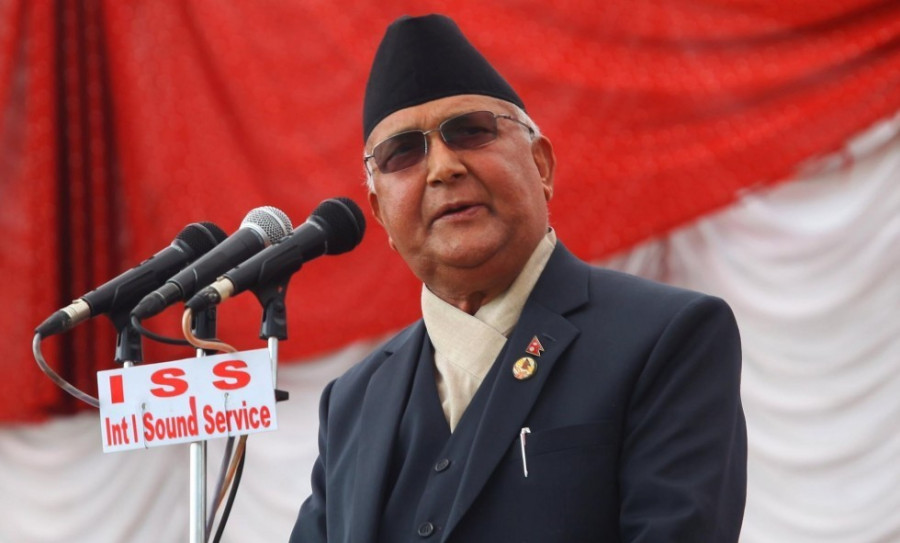National
Oli’ statement supporting private school operators draws criticism
Members of a commission which has suggested turning private schools into trusts say the prime minister must stop making unconstitutional remarks
Binod Ghimire
Inaugurating an education fair on Thursday, Prime Minister KP Sharma Oli lauded the role of private educational institutes in improving the quality of education in the country. He said the government was ready to provide every support for their expansion and would welcome them even to manage state-run schools if they wish.
Oli went on to say that the government can never think of closing private schools and was rather ready for introducing measures to protect them. Oli’s remarks come at a time when his administration has been refusing to make public a report prepared by the High-Level National Education Commission, which has suggested converting private schools into non-profit entities.
Despite repeated demands from members of the commissions and non-government educational organisations, the government is yet to make public the report submitted four months ago.
The commission had handed the report to Oli in the presence of Minister for Education, Science and Technology Giriraj Mani Pokharel on January 15.
It is meant to provide the basis for the formulation of an education policy that fits into the changed political context.
The 25-member commission led by the minister recommends that private schools be converted into “trusts” from companies within 10 years.
It has also suggested that the government regulate exorbitant fees, monitor salaries they pay to teachers and evaluate their infrastructure, which the private education operators have been objecting to.
Shyam Shrestha, a former member of the Constituent Assembly who was also a member of the commission, said Oli’s remarks two days ago and his reluctance to make public the report are part of his strategic move.
“The prime minister’s statement is condemnable,” he told the Post. According to Shrestha, the executive head of the country, who is primarily responsible for protecting the constitution, has given an unconstitutional statement, favouring privatisation in the education.
A majority of the members of the commission concluded that the spirit of Article 31 (2) of the constitution, which makes the state responsible to ensure compulsory basic education and free secondary education for all, is to ensure that every child gets free education. And for that to happen, school education should gradually come under the ambit of the government while the private sector should be facilitated to concentrate on higher education, the report has suggested. It has also recommended increasing investment in public schooling and boosting the quality of education.
Currently, the government is allocating just 10 percent of the national budget to the education sector. The commission has recommended that the government double the budget for the education sector as per Nepal’s global commitment.
Leaders of Oli’s own party, the Nepal Communist Party (NCP), and affiliated wings have also objected to his remarks.
Dhani Ram Poudel, a former minister for education and also a member of the commission, said the prime minister’s statement shows how strong the private school operators are in the country.
He claimed that promoters of the private education sector enjoy close relation with the prime minister. “It’s not surprising that the prime minister is speaking for them,” Poudel, a leader of the ruling party, told the Post. “The government so far has failed to show interest in improving public schools. It is rather working at the behest of private school operators.”
Ranjeet Tamang, general secretary of the All Nepal National Free Student Union, the student wing of the unified communist party, also said it was unfortunate that the prime minister was making statements promoting private schools while the spirit of the constitution is entirely different.
“The government’s goal of ‘Prosperous Nepal, Happy Nepali’ can never be achieved by promoting private schools,” Tamang told the Post. “Instead, there should be adequate focus on improving public schools. I think the government has failed to get its priorities right,” he said. “If the prime minister speaks against the spirit of the constitution, how can we expect others to respect it?”
Oli’s reluctance to make public the commission’s report and his remarks favouring the private education institutions going against the spirit of the constitution are a cause for concern, say commission members and experts.
The commission’s members have even started a signature campaign to press the government to make the report public.
They, however, are yet to submit their signatures to the government after Education Minister Giriraj Mani Pokhrel’s assurances that he would convince Oli.
The National Campaign for Education, an umbrella body of around 239 educational organisations, on March 8 filed a Right to Information plea, demanding that the report be made public. However, the Education Ministry said in its response that it did not have the report and that it was with the Prime Minister’s Office.
Shrestha said the incumbent government should stop being under the illusion that only the private sector can deliver quality education.
“The government should follow the commission’s recommendations,” said Shrestha. “The education policy and the Federal Education Act must be drafted based on its recommendations.”




 9.6°C Kathmandu
9.6°C Kathmandu














